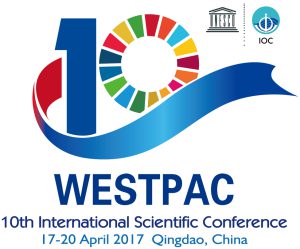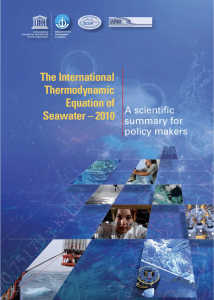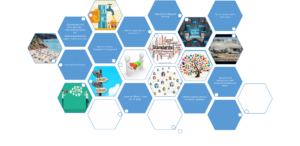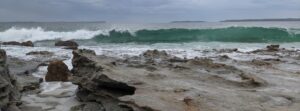Global Ocean Observing System
GOOS is a permanent global system for observations, modeling, and analysis of marine and ocean data.
The Physics and Climate advisory panel to the Global Ocean Observing System (OOPC) is seeking experts to serve on the panel.
The Ocean Observations Panel for Climate (OOPC) is a scientific expert advisory group to the Global Ocean (GOOS) and Global Climate (GCOS) Observing Systems and the World Climate Research Program (WCRP). OOPC is a charged with leading the delivery of ocean physics/climate observation requirements, aiding in the development of strategies for evaluation and evolution of the system, […]
Read more »The Pandemic is Undermining Weather Monitoring
DetailsPublished: 02 February 2021 Scientists are scrambling to patch the cracks forming in the global marine weather monitoring system. Article by Chris Baraniuk in Hakai Magazine.
Read more »The Ocean Decade Creative Exhibit at UNESCO, 11 June – 2 July 2021
You are welcome to visit the Ocean Decade Exhibit on UNESCO fences in Paris, 11 June – 2 July 2021. The Exhibit brings to you award-winning and groundbreaking work by professional designers from across the globe as they seek to “rebrand” ocean science, making knowledge as captivating to society as it is to the people […]
Read more »The new WMO Unified Data Policy: implications for ocean data
For the first time, ocean data and the GOOS Essential Ocean Variables are called out in a WMO Unified Policy. This is a call for action to share ocean data that reaches beyond the global meteorological community. Photo: Sam Greenfield/Volvo Ocean Race 2018 The 2021 Extraordinary World Meteorological Congress (11-22 October) approved the new WMO […]
Read more »The Global Ocean Observing System in the Ocean Decade: Transformation for Sustainable Development
Article by Emma Heslop available for download at Ingenta Connect.
Read more »The 2nd JCOMM Scientific and Technical Symposium on Storm Surges
The 2nd JCOMM Scientific and Technical Symposium on Storm Surges will be held in Key West, Florida, USA, on 8-13 November 2015. It is to be held in conjunction with the 14th International Workshop on Wave Hindcasting and Forecasting. This joint meeting is sponsored by the Taylor Engineering Research Institute at the University of North Florida, Environment Canada […]
Read more »
The 10th WESTPAC International Scientific Conference will take place from 17 to 20 April 2017 in Qingdao, China.
This Conference will offer an essential opportunity in the region for marine scientists, ocean institutions and their countries to advance marine scientific knowledge, catalyze multi- and cross-disciplinary collaborations with a view to addressing challenges that countries in this region are facing, including these in achieving the Sustainable Development Goals, particularly the dedicated Goal 14 for […]
Read more »
TEOS-10 Summary for Policy Makers
The International Thermodynamic Equation of Seawater – 2010: A scientific summary for policy makers. This booklet describes the new standards for interpretation of salinity, temperature and pressure of seawater to derive fundamental quantities such as density, speed of sound, heat capacity of seawater. The previous “Equation of State of Seawater” involved empirical polynomial expansions for […]
Read more »
Tenth Session of the GOOS Regional Alliance Forum (GRF-X): Approaches for a Thriving Regional Coordination Ecosystem
The Tenth Session of the GOOS Regional Alliance Forum (GRF-X) was held online through a series of four meetings (9 and 10 September, 27 October, and 16 December 2021). The Forum, led by GOOS Regional Council Chair R. Venkatesan, convened the representatives from thirteen GOOS GRAs, as well as emerging national GRAs. The GRF-X discussed […]
Read more »
Streamlining ocean observing around the world: Ocean Best Practices
International experts are working together to improve the way we monitor the ocean through the development of Ocean Best Practices – common methods across ocean research, operations and applications that allow interoperability and reproducibility of ocean data and information. Our society relies on timely ocean information every day. Data coming from ocean observations underpins weather […]
Read more »